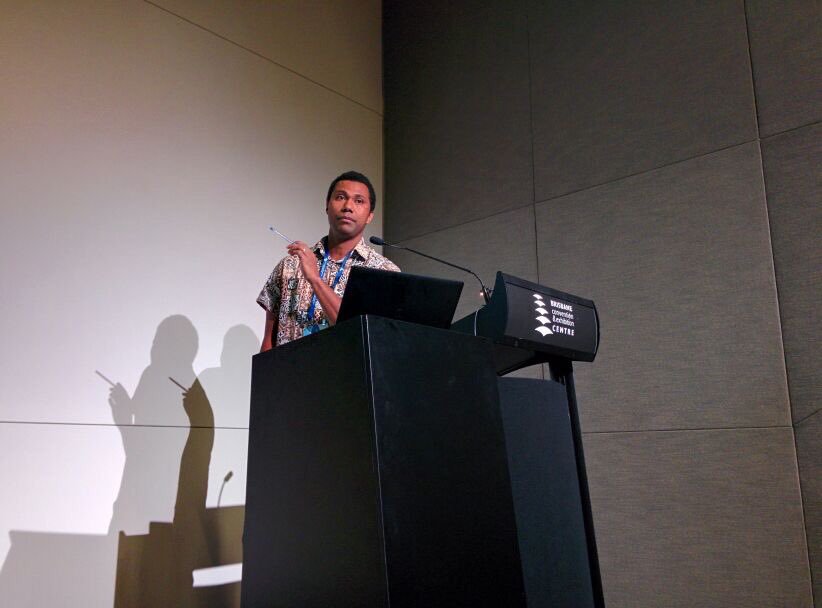Just prior to the SCBO 2016 Brisbane conference, we released a Draft Diversity Statement and invited members to provide feedback on how SCB Oceania can uphold its commitment to diversity.
During the conference we asked attendees to tweet using the #SCBODiversity hashtag and discussed the draft statement during a group session.
Finally, we asked for feedback in the post-conference survey, so in total we received some fantastic input.
How do you define diversity in SCB Oceania?
Survey respondents and those who participated in the discussion group considered that diversity in SCB Oceania incorporates:
- Ethnicity, gender, culture, language and nationality
- Organisation, sector and profession
- Equity of opportunity
- Access and inclusion – mental health, chronic health, differing abilities
- Research discipline, field of study and topic
- Methods of doing conservation – diversity of conservation approaches
- Respect for all
It is above all the diversity of origins of the attendance because Oceania is so vast and diverse.
More diverse ethnicities, topics of research; acceptance of more diverse approaches to conservation.
People from different countries, different organisations (research/NGO/govt, etc.), at different career stages.
What could SCB Oceania do to support a diverse, inclusive, and equitable membership and leadership?
A number of survey respondents commented that SCB Oceania seems to be doing a good job in supporting diverse, inclusive, and equitable membership – and highlighted the travel scholarships the SCBO 2016 scientific committee awarded as an example of this.
The SCBO 2016 scientific committee awarded a total of AUD $70,000 in travel scholarships to allow students, scientists and practitioners to attend our conference. Whilst the number of travel grant applicants exceeded our ability to fund everyone who requested support, we were able to provide 27 full scholarships (flights, accommodation, and registration fees) and 63 partial scholarships. Our travel award recipients came from 19 different countries. We are incredibly grateful to the Thomas Foundation, Queensland University of Technology, and Tourism and Events Queensland for their funding support.

Of course, we can always do better. Suggestions included:
- Providing better support to Indigenous Australians to participate in SCBO conferences
- Fostering the development of new Chapters
- Greater inclusion of non-university conservation professionals (private sector, NGOs and government)
- Youth participation. Support for undergraduate and honours students to attend and present at SCBO conferences
- Incorporate different presentation format in the conference program, e.g storytelling, traditional ways of communication
- Support from the Board and the conference committee for anyone wishing to develop symposia or session
- Create spaces at the conference that facilitate small group interaction
- Buddy system for new conference attendees
- Facilitate linkages between people and organisations tackling similar conservation issues to share knowledge and experience
Thank-you to everyone who provided comments, critique and suggestions – it is greatly appreciated, and this feedback will help to inform SCBO’s annual work plan and the development of the Wellington conference in 2018. Of course, we are always eager for additional help in implementing new initiatives, so if you have a passion for seeing an idea become reality, please get in touch and we will work to make it happen (you don’t have to be a member of the Board to be active in SCBO). Similarly, if you would like support and guidance on how to start a local Chapter, or to run a session or symposium at the next conference – get in touch with us at the earliest opportunity.
What are some of your reasons for wanting to see diversity, inclusion, and equity in SCB Oceania?
There were so many insightful responses to this question, that they speak for themselves:
It’s critical to the success of such an organisation and mission.
Conservation is a diverse area and to do it well, the organisation itself needs to capture, reflect and apply diversity principles.
Diversity leads to better ideas, broader perspectives, and better integration between.
So that we can learn from each other. I believe diversity allows for the sharing of a range of skills, knowledge and experience, which can only help improve conservation.
What else is the point of a regional group then to provide a forum for all its members?
It’s important to not become “locked” into specific ways of thinking, and diversity helps prevent this.
Because it is the right thing to do.
It is more fun!
Thanks again to all who provided input, and anyone who wishes to be more involved in future discussions about diversity in SCBO can contact us.
SCB Oceania gratefully acknowledges the work of the Equity, Inclusion, and Diversity Committee of the Society for Conservation Biology in developing the text of the draft statement, and Cynthia Malone and Matt Herbert for co-facilitating the diversity discussion during the SCBO 2016.

